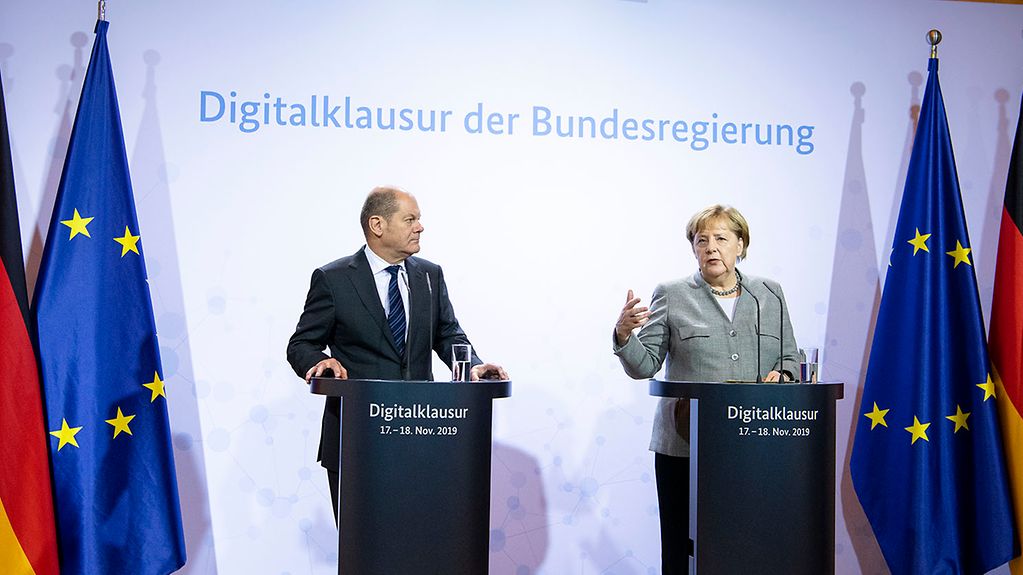Cabinet retreat in Meseberg
Ten million electric vehicles on the roads by 2030. About 1.1 billion euros to be invested in new mobile communications sites. Digitalisation of all government administrative services by 2022. At the retreat in Meseberg, the German government agreed on measures and strategies to make Germany fit for a digital future.
4 min reading time

At the close of the retreat, Chancellor Angela Merkel and Vice Chancellor Olaf Scholz reported on the outcomes
Photo: Bundesregierung/Bergmann
At the close of the two-day retreat in Meseberg, Chancellor Angela Merkel summed up. "A lot of work lies ahead of us – both in terms of hardware such as the mobile communications strategy, extending the mobile communications network and expanding broadband coverage, and in terms of digitalising our own administration and the way we interact with citizens."
On 17 and 18 November 2019, the Cabinet met for a retreat at Schloss Meseberg that focused on key aspects of digitalisation.
Digitalisation for people’s wellbeing
Four key questions dominated the Cabinet retreat in Meseberg: Does our infrastructure provide a good enough foundation for forging ahead with digitalisation? What does modern e-government look like? Can we manage to retain responsible and innovative value creation in a data-driven world? And how are digital technologies such as artificial intelligence and block chain technology changing our society?
The German government "is using digitalisation for people’s wellbeing, to enhance our prosperity, and to retain people’s sovereignty," said Angela Merkel at a press conference with Vice Chancellor Olaf Scholz.
Mobile communications strategy and e-government
The key issues on day one were the digital infrastructure in Germany and the status of e-government. The Cabinet discussed the Onlinezugangsgesetz (Online Access Act) and the digitalisation of family-related benefits. The German government aims to make all state benefits available online by 2022. This is the focus of the expert network Tech4Germany, which was also invited to Meseberg. Interdisciplinary Tech4Germany teams work in government digitalisation projects, upgrading the administration and making it fit for digitalisation.
Cryptocurrency, deepfakes and data strategy
On Monday everything revolved around new developments in the field of artificial intelligence and digital currencies. The Cabinet looked at the opportunities offered by artificial intelligence, and the challenges it poses including "deepfakes" - in which artificial intelligence is used to falsify images and videos, such that they are indistinguishable from the original. Bundesbank President Jens Weidmann was also invited to Meseberg where he spoke on the opportunities and risks posed by cryptocurrencies.
A regular Cabinet meeting also took place.
The essentials, in detail:
Better mobile coverage
Germany’s infrastructure must be expanded to handle digital change – that is the crux of the Gesamtstrategie Mobilfunk (overall strategy for mobile communications). One important point is that the government intends to invest about 1.1 billion euros from the Digital Infrastructure Special Fund in developing 5,000 inaccessible mobile communications sites. The mobile communications strategy aims to put Germany in a leading international position with across the board 4G coverage. This is also an important preconditions for the roll-out of 5G, where the Federal Republic of Germany aims to become more of a global trail-blazer.
Masterplan charging structure and environmental bonus
To advance electric mobility in Germany, the Cabinet adopted the Master Plan for Charging Infrastructure. It lays out measures designed to ensure the swift roll-out of a nationwide, user-friendly charging infrastructure for up to ten million electric vehicles by 2030. The government has also raised the environmental bonus to make it more attractive to purchase electric vehicles.
Digitalisation of family-related benefits
Parents in some federal states in Germany can already apply for parental benefit online using a simple procedure. In future, more e-government services are to make it easier for families to apply for benefits with a view to cutting red tape and putting in place a more modern, more effective social welfare system. The cornerstones were decided on in Meseberg, and a bill is planned for March 2020.
Handling data responsibly
How can we manage, in a data-driven world to ensure that value creation is responsible and innovative? This is another important question on the agenda of the Cabinet retreat. Bundesbank President Jens Weidmann was in Meseberg to discuss with the Cabinet the opportunities and risks posed by digital currencies, or cryptocurrencies as they are also known.
"Deepfakes" – a major challenge
Artificial intelligence offers many opportunities, but also poses many challenges, especially for our democratic order. Experts agree that in future elections could be massively influenced by "deepfakes" in which artificial intelligence is used to falsify images and videos, such that they are indistinguishable from the original. In Meseberg, the government discussed strategies for addressing deepfakes with experts.
German government’s data strategy
Data can be hugely helpful, in fighting diseases for instance. But it is vitally important to ensure that they are not misused. In Meseberg the German government agreed on the main lines of its data strategy. The aim is to improve the provision of and access to data, to foster responsible use of data, enhance data competence within German society, and make the state a trailblazer in a new data culture.
Alongside resolutions on digitalisation, the Cabinet agreed on measures to improve the situation of pensioners, employees and the private sector. In the coming year, pensions are to rise significantly. Parallel to this, recipients of company pensions are to see their burden lightened, while contributions to unemployment insurance are to be reduced.